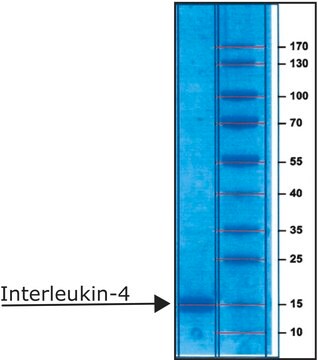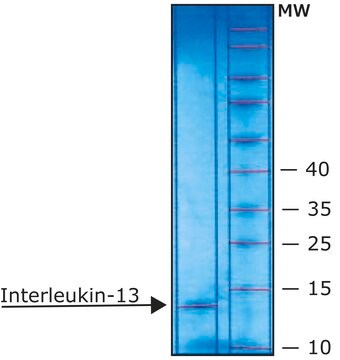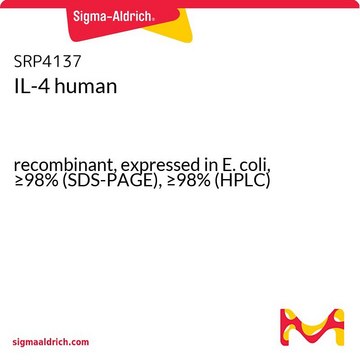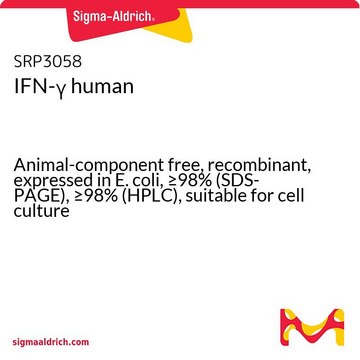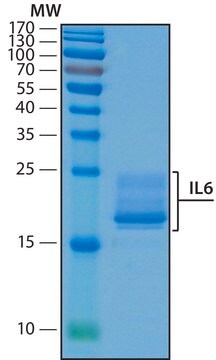推荐产品
生物源
human
品質等級
重組細胞
expressed in HEK 293 cells
化驗
>95% (SDS-PAGE)
形狀
lyophilized powder
效力
≤0.6 ng/mL EC50
品質
endotoxin tested
分子量
dimer 14-19 kDa (glycosylated)
包裝
pkg of 1 mg
pkg of 10 μg
pkg of 100 μg
製造商/商標名
HumanZyme
技術
cell culture | mammalian: suitable
雜質
<1 EU/μg
UniProt登錄號
儲存溫度
−20°C
基因資訊
human ... IL4(3565)
正在寻找类似产品? 访问 产品对比指南
相关类别
一般說明
Interleukin-4 (IL-4) is a pleiotropic cytokine and a complex glycoprotein mapped to human chromosome 5q31.1. It is produced by mast cells, basophils and a subset of activated T cells.
生化/生理作用
Interleukin-4 (IL-4) interacts with interleukin 13 and is an interleukin-4 receptor ligand. It regulates IgE and IgG1 production by B cells. IL-4 favors glial and neuronal differentiation and regulates differentiation of naive cluster of differentiation CD4+ T cells to the T helper type 2 (TH2) cells. Polymorphism in the IL-4 gene is implicated in immune and inflammatory disorders. In cerebral infarction, IL-4 levels are elevated.
外觀
Lyophilized from a 0.2 μm filtered solution of 1x PBS.
準備報告
HumanKine Interleukin-4 (IL-4), expressed in human HEK 293 cells, is a glycosylated monomer with an apparent molecular mass of 14-19 kDa due to glycosylation, which is absent when this cytokine is expressed in E. coli. Production in human HEK 293 cells offers authentic glycosylation. Glycosylation contributes to stability in cell growth media and other applications.
分析報告
The activity is determined by the dose-dependent simulation of the proliferation of human TF-1 cells (human erythroleukemic indicator cell line).
法律資訊
HumanKine is a registered trademark of Proteintech Group, Inc. and Humanzyme, Inc
儲存類別代碼
11 - Combustible Solids
水污染物質分類(WGK)
WGK 3
閃點(°F)
Not applicable
閃點(°C)
Not applicable
其他客户在看
IL-4: role in disease and regulation of production.
P Choi et al.
Clinical and experimental immunology, 113(3), 317-319 (1998-09-16)
Muscle as an endocrine organ
Muscle and Exercise Physiology, 13(4) (2019)
Interleukin 4 Receptor
Muscle and Exercise Physiology, 13(4) (1998)
Neurogenesis, Inflammation, and Mental Health
Inflammation and Immunity in Depression, 13(4) (2018)
Cody J Warren et al.
Cell, 185(21), 3980-3991 (2022-10-02)
Simian arteriviruses are endemic in some African primates and can cause fatal hemorrhagic fevers when they cross into primate hosts of new species. We find that CD163 acts as an intracellular receptor for simian hemorrhagic fever virus (SHFV; a simian
我们的科学家团队拥有各种研究领域经验,包括生命科学、材料科学、化学合成、色谱、分析及许多其他领域.
联系技术服务部门
